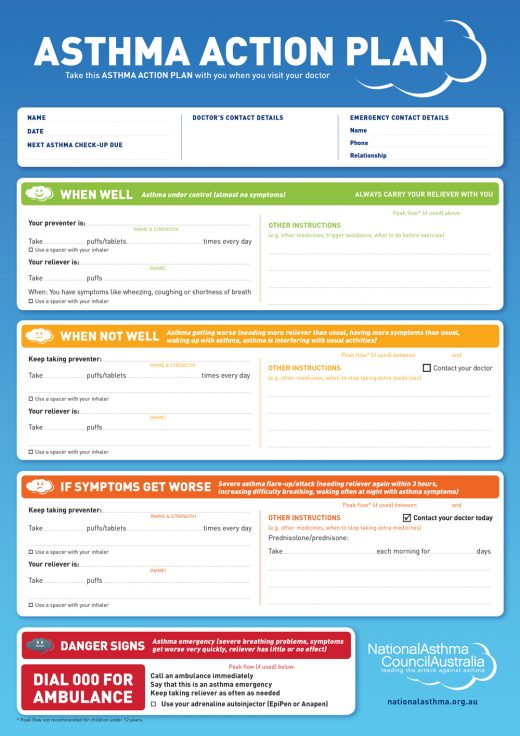Medicines are essential for managing asthma. Everyone with asthma should have their own up-to-date written asthma action plan with instructions on what to do when symptoms worsen.
Good asthma care also involves treatment for other health conditions that can affect asthma. A healthy lifestyle helps people with asthma stay in control of their symptoms and feel well.
The main aims of asthma treatment are:
- to keep lungs as healthy as possible
- to keep symptoms under control
- to stop asthma from interfering with school, work or play
- to prevent flare-ups or ‘attacks’.
Medicines
The two main types of asthma medicines are relievers and preventers. Every child, adolescent or adult with asthma needs to have a reliever inhaler (e.g. puffer) available at all times, so they can use straight away if they have asthma symptoms.
Most adults and adolescents, and some children, also need to take daily preventer treatment to reduce their risk of flare-ups (attacks). Most preventers contain inhaled corticosteroids – a type of medicine that soothes inflammation inside the lungs.
Some other medicines (e.g. prednisolone tablets) are used for severe asthma flare-ups. Asthma cannot be safely treated without medicines – a severe flare-up (attack) could be fatal. The best choice of treatment will depend on the person’s age, symptoms and which type of inhaler they find easiest to use properly.
Using your inhaler properly is important for you to get the full benefit of the medication. The steps are different for each type of inhaler – follow the instructions carefully and ask your doctor, nurse or pharmacist for training.
Some inhalers should be used with spacers. Some types of plastic spacers must be prepared before first use – otherwise the medicine will stick to the insides instead of being breathed in. Non-static spacers do not need any special preparation before first use.
For most asthma medicines, the Australian health system pays part of the cost. To be sure what to expect, ask your doctor how much the medicine will cost you.
What is good asthma control?
Doctors assess recent asthma control by asking about symptoms during the previous 4 weeks.
- Activities are not limited at all by asthma
- No asthma symptoms during the night (including coughing during sleep) or on waking up
- Daytime symptoms on no more than 2 days per week
- Need to take the reliever on no more than 2 days per week (not counting reliever taken before exercise)
- Any symptoms go away quickly after using the reliever puffer.
What is an asthma action plan?
An asthma action plan is a set of instructions for managing your asthma or your child’s asthma. The plan is made by you and your doctor together, and then written down for you to keep.
An asthma action plan includes:
- a list of the person’s usual asthma medicines, including doses
- instructions on what to do when asthma is getting worse, when to take extra doses or extra medicines, and when to contact a doctor or go to the emergency department
- what to do in an asthma emergency
- the name of the doctor or other health professional who prepared the plan
- the date.
Everyone with asthma (all children and adults) should have their own, personalised asthma action plan. Asthma action plans should be checked and updated at least once a year. Bring your action plan or your child’s action plan whenever you visit your doctor.
We have a number of asthma action plan examples available as well as action plans in other languages.

Asthma care tips
- Everyone with asthma needs their own reliever puffer with them at all times. Young children’s parents, carers and teachers need to know when and how to give the medicine.
- If symptoms do not improve, tell your doctor.
- Taking reliever medicine often means asthma is not well controlled, and the person may be at risk of serious flare-ups. People who need to take their reliever more than twice a week for asthma symptoms need a check-up.
- Children and adults need training to use inhalers correctly. Visit our How-to Video Library on inhaler use.
- Ask your doctor, nurse or pharmacist to check that you are taking the medicine properly. When you visit your doctor for asthma rechecks, tell your doctor if you are having any problems using an inhaler or if you are not sure your technique is correct.
- Ask your doctor about possible side-effects of all your medicines. If you have any concerns, tell your doctor or pharmacist and ask for more information.
- If you take regular preventer medicine, never change the dose without talking to your doctor first (unless your written asthma action plan tells you when and how to alter your treatment).
Related Resources

Brochure
My Asthma Guide
My Asthma Guide is a handbook designed to help patients understand and manage their asthma.
